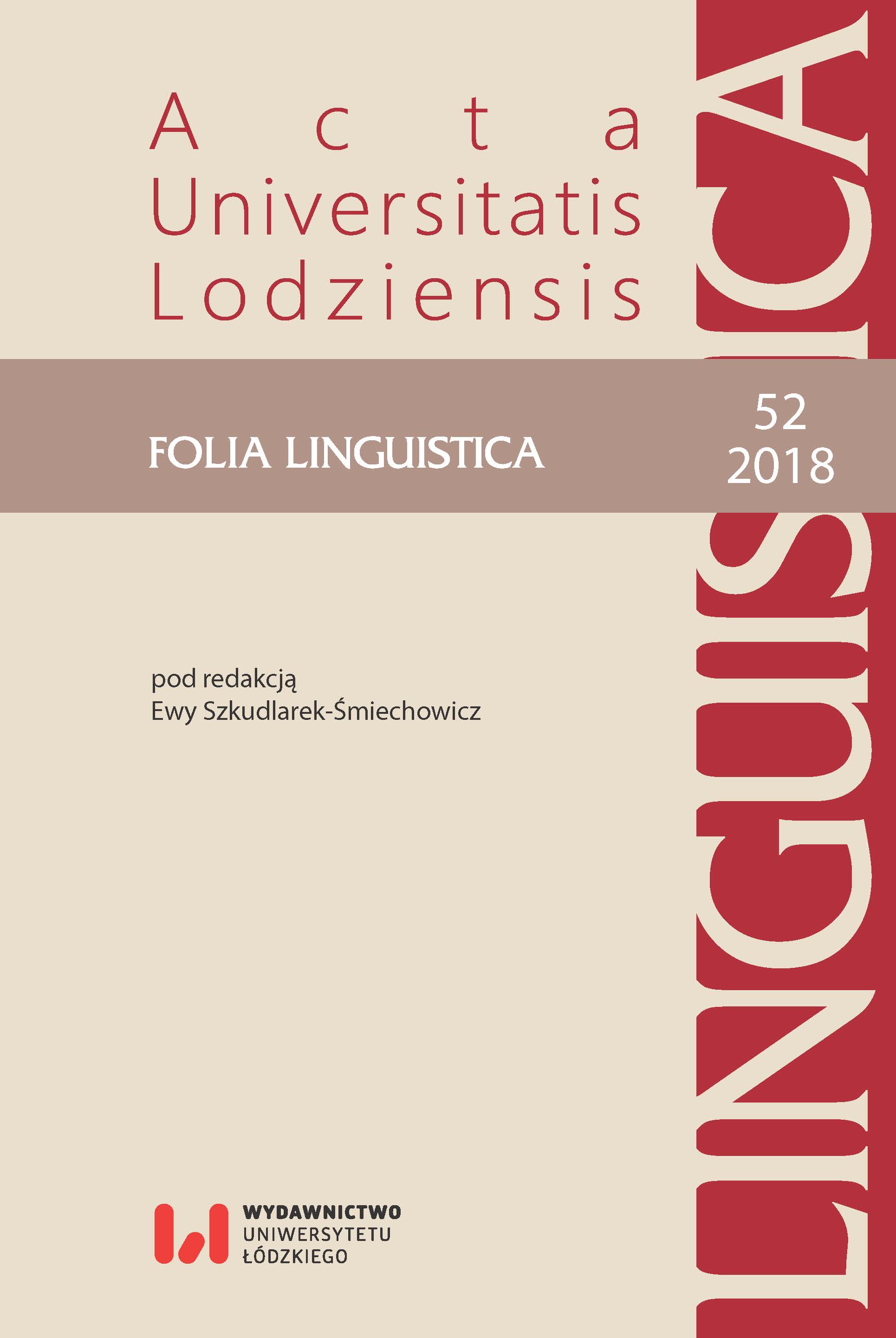Akcent prezenterów radia BBC
DOI:
https://doi.org/10.18778/0208-6077.52.08Słowa kluczowe:
akcent RP, prezenterzy radia BBCAbstrakt
Artykuł opisuje badanie audytoryjne oraz akustyczne przeprowadzone na nagraniach prezenterów czterech stacji radiowych BBC: BBC Radio 1, BBC Radio 4, BBC Radio 5 Live i BBC World Service w trzech typach audycji: wiadomościach, wiadomościach sportowych oraz programach rozrywkowych. Badanie miało na celu znalezienie odpowiedzi na pytanie, czy występują różnice w akcencie brytyjskich prezenterów reprezentujących różne stacje radiowe BBC oraz prowadzących różne typy audycji, a także — jeśli w istocie tak jest — w jakich kontekstach używany jest formalny, standardowy brytyjski akcent RP oraz jaką pełni funkcję. Szczegółowym analizom poddano dwa zjawiska fonetyczne: h-dropping, czyli elizję dźwięku /h/ w pierwszej akcentowanej sylabie w słowie, oraz /t/ glottalling, czyli zastąpienie głoski /t/ przez zwarcie krtaniowe. Badanie potwierdziło występowanie różnic w akcencie prezenterów. W wiadomościach względnie często zauważono występowanie standardowego akcentu RP, natomiast w programach rozrywkowych oraz wiadomościach i reportażach sportowych znacznie rzadziej. Badanie pokazało także, że różnice w wymowie prezenterów odzwierciedlają różnice poszczególnych stacji radiowych: stacje ukierunkowane na młodych odbiorców mają większy zasób regionalnych, niestandardowych akcentów aniżeli stacje ukierunkowane na dorosłych odbiorców, skupiające się na przekazie informacji.
Pobrania
Bibliografia
Crystal D., 2000, Language developments in British English, in: M. Higgins, C. Smith, J. Storey (eds.), The Cambridge Companion to Modern British Culture, Cambridge: Cambridge University Press.
Google Scholar
Crystal D. (ed.), 2008, A Dictionary of Linguistic and Phonetics, Oxford: Blackwell Publishing Ltd.
Google Scholar
Fabricius A., 2000, T-glottaling between stigma and prestige: a sociolinguistic study of modern RP, Copenhagen: Copenhagen Business School.
Google Scholar
Giles H., 1973, Accent mobility: a model and some data, “Anthropological Linguistics”, no. 15.
Google Scholar
Hannisdal B.R., 2006, Variability and change in RP: a study of six phonological variables in the speech of television newsreaders, Bergen: University of Bergen.
Google Scholar
Honey J., 1989, Does accent matter? The Pygmalion Factor, London: Faber and Faber Limited.
Google Scholar
Honey J., 1997, Sociophonology, in: F. Coulman (ed.), The Handbook of Sociolinguistics, Oxford: Blackwell Publishers.
Google Scholar
Hughes A., Trudgill P., 1996, English accents and dialects. An introduction to social and regional varieties in English in the British Isles, London: Arnold.
Google Scholar
Meyerhoff M., 2006, Introducing Sociolinguistics, Oxon: Routledge.
Google Scholar
Reith J.C.W., 1924, Broadcast over Britain, London: Hodder and Stoughton.
Google Scholar
Schwyter J.R., 2016, Dictating to the Mob. The History of the BBC Advisory Committee on Spoken English, Oxford: Oxford University Press.
Google Scholar
Stockwell P., 2007, Sociolinguistics. a resource book for students, Oxon: Routledge.
Google Scholar
Trudgill P., 1999, Norwich: Endogenous and exogenous change. In Foulkes & Docherty (eds), Urban voices. Accent Studies in the British Isles, London: Arnold.
Google Scholar
Weatherall A., 2002, Gender, language and discourse, London: Routledge.
Google Scholar
Wells J.C., 1982a, Accents of English I. An Introduction, Cambridge: Cambridge University Press.
Google Scholar
Wells J.C., 1982b, Accents of English II. The British Isles, Cambridge: Cambridge University Press.
Google Scholar
Wells J.C., 1994, The Cockneyfication of RP?, in: G. Melchers, N.-L. Johannesson (eds.), Nonstandard Varieties of Language. Papers from the Stockholm Symposium, 11–13 April 1991, Stockholm: Almqvist & Wiksell International.
Google Scholar
Morrish J., 1999, The accent that does not dare speak its name, “The Independent”, 21 March 1999, http://www.phon.ucl.ac.uk/home/estuary/morrish.htm (accessed: 20.04.2017).
Google Scholar
Trudgill P., 2008, The historical sociolinguistics of elite accent change: On why RP is not Disappearing, “Studia Anglica Posnaniensia” 44, http://www.ifa.amu.edu.pl/sap/files/44/01_Trudgill.pdf (accessed: 20.02.2018).
Google Scholar
Wells J. C., 1997, Whatever happened to Received Pronunciation?, in: Medina & Soto (eds.), Il Jornadas de Estudios Ingleses, Universidad de Jaen, 19–28, http://www.phon.ucl.ac.uk/home/wells/rphappened.htm (accessed: 20.03.2018).
Google Scholar
http://www.bbc.co.uk/radio (online source 1) (accessed: 20.04.2018).
Google Scholar
https://www.bbc.co.uk/radio/schedules (online source 2) (accessed: 20.04.2018).
Google Scholar
Pobrania
Opublikowane
Jak cytować
Numer
Dział
Licencja

Utwór dostępny jest na licencji Creative Commons Uznanie autorstwa – Użycie niekomercyjne – Bez utworów zależnych 4.0 Międzynarodowe.










